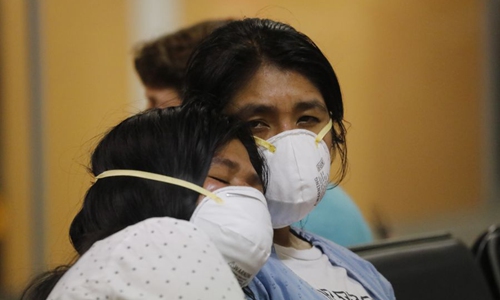HOME >> WORLD
Latin America on lookout for COVID-19 as caseload tops 100
Source:Xinhua Published: 2020/3/16 12:39:15

People wear protective masks in the boarding area of international flights at the Jorge Chavez International Airport, in the constitutional province of Callao, Peru, on March 6, 2020. (Photo by Mariana Bazo/Xinhua)
COVID-19 cases continued to rise across Latin America as countries rolled out new measures on Sunday to slow the spread of the pandemic.Ecuador's Ministry of Foreign Affairs announced a "total suspension" of incoming passenger flights starting from March 17 to April 5.
All travelers regardless of nationality arriving before or after this period must self-quarantine upon arrival, it said.
Authorities chose the Tuesday deadline with consideration for those already in transit. Outgoing flights are not affected.
The ban "will not include cargo flights solely carrying merchandise, correspondence, postal shipments or humanitarian aid," according to authorities.
Ecuador has confirmed nine new cases of the virus, bringing the total to 37, with two fatalities.
Colombian President Ivan Duque Marquez announced that his country will bar entry of all foreigners starting from Monday, while nationals and foreign residents returning from abroad will have to undergo a two-week quarantine.
"All Colombian passengers and resident foreigners will have obligatory preventive isolation for 14 days," he said on Twitter.
Immigration authorities said Saturday they expelled five foreigners for failing to voluntarily quarantine themselves after arriving in the country.
The Colombian Health Ministry's latest bulletin reported 10 new cases, among them seven people contracted the disease abroad and three caught the virus locally, bringing the number of total confirmed cases to 34.
In Chile, health officials confirmed 14 new cases, raising the total to 75. Most of the cases are in the capital Santiago and the metropolitan region, followed by the central city of Maule, some 200 km to the south.
Classes at the elementary, secondary and university level have been suspended in Santiago and 20 other cities.
The number of cases in Argentina has climbed to 56, with two fatalities.
Argentine President Alberto Fernandez announced that his government will suspend classes and close the borders for 15 days. The borders will be open to Argentines and resident foreigners.
"We are fighting an invisible enemy that can suddenly nest in one of us and turn us into a carrier ... we have to realize that the virus can attack us and we can cause harm to others," he said.
In light of the shortage of basic antiseptics and disinfectants, Costa Rica's government launched a website where people can buy alcohol-based antibacterial gel and have it delivered to their homes.
Households can purchase up to two 350-ml bottles a month at about 4 U.S. dollars each and the "postal service will undertake a whole fulfillment process," said Jorge Solano, general manager of Costa Rica's postal service.
The state-run National Liquor Factory is manufacturing antiseptic in Costa Rica, where there are 35 confirmed cases.
In Mexico, where 41 cases have been confirmed, the Mexican football league Liga MX said it would indefinitely suspend professional tournaments following Sunday's match.
Meanwhile, educational authorities announced they were prolonging the two-week Holy Week holiday to four weeks, meaning some 250,000 public schools and universities would close from March 20 to April 17.
A Brazilian judge banned mass gatherings at the country's largest Catholic pilgrimage site, the Aparecida National Sanctuary, citing concerns over the spread of viral infection.
Individual visits are still allowed at the site in Aparecida, a town some 90 km from the city of Sao Paulo, Brazil's largest metropolis.
The ban will remain in place for 30 days, affecting Holy Week celebrations there.
Brazil, as Latin America's largest country, reported a total of 200 cases, an increase of more than 50 over Saturday, while Peru reported 71, Venezuela, 17, and Bolivia, 11.
Guatemala reported its first coronavirus-related death, involving an 85-year-old patient who contracted the virus on a trip to Spain.
Posted in: AMERICAS